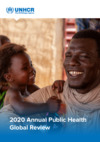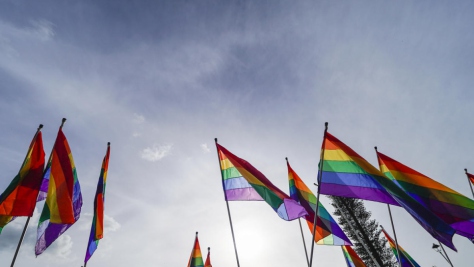A huge burden lifted as refugee restaurant owner gains Estonian citizenship
Karwan has worked hard to fit in, learning the language, making friends, finding employment, starting a family. It all paid off earlier this year.
TALLINN, Estonia, May 11 (UNHCR) - Karwan first passed through Estonia in 2003 when he was on the run from Iraq's Kurdistan region during the rule of Saddam Hussein and heading for Finland, where he had close relatives. Denied entry to Finland, immigration officers sent him back to Estonia.
It was not a warm welcome. He was handcuffed at the border and taken to a detention centre, where he was held for six months. But after being provided with subsidiary protection status in Estonia, he decided to try and start a new life in the capital Tallinn.
After struggling at first, 37-year-old Karwan has learned the language, made friends, found employment, married a girl from Georgia and started a family. In mid-February this year, he also became the first person allowed to stay on humanitarian grounds to be granted Estonian citizenship.
He has certainly worked hard to be accepted. "I have many friends here. With Estonians, I have never felt the attitude that I don't belong," he revealed, adding: "Now it's even better than before. Maybe it's because I speak Estonian and that makes them more forthcoming, more open to talk and communicate."
But things looked grim in 2003, when Karwan fled from his homeland to escape years of persecution and warfare. "I remember one night in the 1980s, when my mother woke me up and took me to the basement because the planes were coming [to bomb]," he recalled. "Our lives were in danger all the time."
His mother died in their mountain refuge, and talking about this brought back bad memories. "I still feel the cold and the hunger, and when we went back to the village I couldn't study anymore," Karwan recalled. In his mid-20s, he decided it was time to find a country where he would feel safe and could study in peace.
He made his way north through Turkey and the Russian Federation before ending up in Estonia. After being given international protection status, which allowed him to travel and work, Karwan rented an apartment and looked for a job.
It was a bit of a struggle, but he persevered and was hired by a car wash before finding work as a chef, making shashlik in a fast food restaurant. He eventually saved enough money to open his own restaurant in Tallinn almost exactly three years ago. "Our place is unique . . . We butcher our own meat and make fresh kebabs and falafel," Karwan proudly revealed.
His life revolves around the restaurant and his wife and two children, a boy aged seven years and a six-year-old girl. "A lot of my friends come to the restaurant to enjoy the food and have a chat. I really like their different backgrounds," he said.
But although he was well integrated, Karwan always felt something was missing until he became an Estonian citizen at a ceremony in Tallinn in February. "There was a huge burden on my shoulders, and now it was lifted," he told UNHCR. "Everything felt different, safer, better." The proud new Estonian celebrated with his family and staff. "I bought dessert for people here at work - a small party with food - and just sat and talked."
He's not completely out of the woods. His children are currently regarded as Iraqi, even though they were born in Tallinn. But Estonia changed its citizenship law at the start of this year and when it comes into force on January 1, 2016, beneficiaries of international protection will not have to prove that they have relinquished their former citizenship to obtain Estonian nationality.
This will help his children as well as other people given international protection (about 90 people in Estonia at the end of last year). Also in 2014, a total 143 new asylum applications were lodged, up 50 per cent on the year before, with the bulk coming from the Ukraine and Sudan. And 20 people were granted refugee status in Estonia last year.
Karwan, meanwhile, is looking forward to an even rosier future. "I love working here," he said, adding that he was thinking of opening a second restaurant.
By Salvador Merlos and Eero Janson in Tallinn, Estonia
Related news and stories
Twelve years on, Syrian refugees face deepening debt and hunger
UN Refugee Agency warns of extreme hardship for forcibly displaced families this winter
How Thailand's grassroots organizations are working to end statelessness
Iraqi doctor provides care and comfort to Yazidi survivors
Iraqi doctor provides care and comfort to Yazidi survivors
Yazidi women box their way to recovery
-

Six athletes to make up Refugee Paralympic Team at Tokyo Games
30 Jun 2021 Competitors in four sports – including first female refugee Paralympian – ready to take to world stage after beating the odds despite being forced to flee their homes. -

'We are the lucky ones'
30 Jun 2021 Ethiopian refugee Mihret hid in the bush for days without food or water, to escape the Tigray conflict. Now safe in Sudan, she is using her engineering skills to assist her community. -

2020 Annual Public Health Global Review
30 Jun 2021 UNHCR aims to ensure healthy lives and promote wellbeing of its persons of concern, enabling them to access safe, effective, equitable and affordable health care services. -

News Comment by UNHCR EU Representative on launch of Slovenian Presidency of the European Union
30 Jun 2021 This news comment is attributable to Gonzalo Vargas Llosa, UNHCR Representative to the EU, Belgium, Ireland, Luxembourg, and the Netherlands -

IPC announces six athletes to compete for the Refugee Paralympic Team at the Tokyo 2020 Paralympic Games
30 Jun 2021 Joint IPC/UNHCR Press Release -

Responding to the health and protection needs of people selling or exchanging sex in humanitarian settings
30 Jun 2021 This joined UNHCR and UNFPA guidance proposes actions for responding to the health and protection needs of people who sell or exchange sex in humanitarian settings. It covers different settings (e.g. in acute emergencies or during periods of transition or stabilization or protracted displacements; in or out of camp), and different population groups affected by humanitarian crises and highlights alignment with broader human rights frameworks for responding to the health and protection needs of people who sell or exchange sex. -

Global Roundtable charts joint action for protection of forcibly displaced LGBTIQ+ people
29 Jun 2021 Joint Press Release by UNHCR and UN Independent Expert on Protection Against Violence and Discrimination Based on Sexual Orientation and Gender Identity -

Tip sheet on applying the UNHCR age, gender and diversity policy to children
29 Jun 2021 -

Tip sheet on applying the UNHCR age, gender and diversity policy to older people
29 Jun 2021

